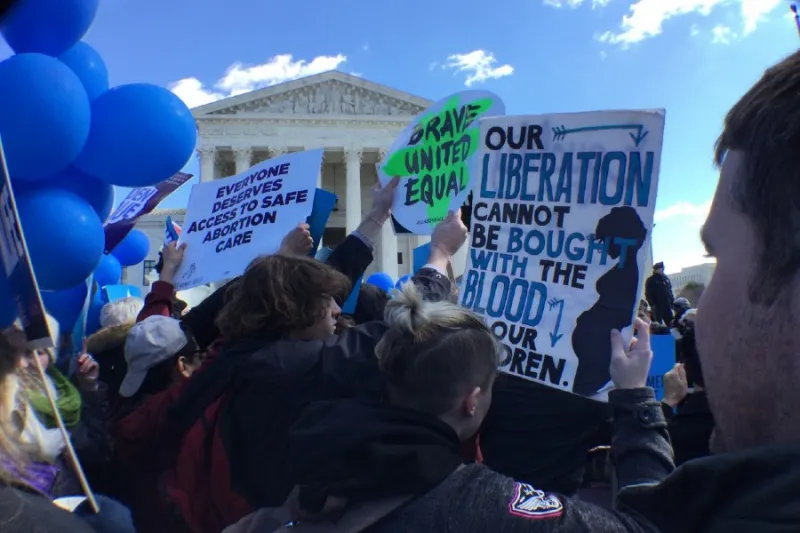
Washington, D.C. Newsroom, Jun 24, 2022 / 10:00 am (CNA).
The U.S. Supreme Court heard a historic case on Dec. 1, 2021 that directly challenged Roe v. Wade, the 1973 ruling that legalized abortion nationwide. And on June 24, 2022, the court issued its ruling, overturning Roe v. Wade and Planned Parenthood v. Casey and returning the question of abortion policy to the states.
Here’s what you need to know:
1. What was the case about?
The case, known as Dobbs v. Jackson Women’s Health Organization, involved a 2018 Mississippi law restricting most abortions after 15 weeks. “Dobbs” stands for Thomas E. Dobbs, who serves as the state health officer of the Mississippi State Department of Health. Jackson Women’s Health Organization provides abortion in Jackson, Mississippi, and is the only abortion clinic in that state.
The case centered on the question of “Whether all pre-viability prohibitions on elective abortions are unconstitutional,” or whether states can ban abortion before a fetus can survive outside the womb. The case challenges two landmark abortion cases that Mississippi calls “egregiously wrong”: Roe v. Wade and Planned Parenthood v. Casey.
2. Why did the case challenge Roe and Casey?
In Roe v. Wade, the court ruled that states could not ban abortion before viability, which the court determined to be 24 to 28 weeks into pregnancy. Nearly 20 years later, the court upheld Roe in Planned Parenthood v. Casey. The 1992 ruling said that while states could regulate pre-viability abortions, they could not enforce an “undue burden,” defined by the court as “a substantial obstacle in the path of a woman seeking an abortion of a nonviable fetus.”
Mississippi’s Gestational Age Act, the subject of the Dobbs case, bans abortion weeks before the point of viability.
“Under the Constitution, may a State prohibit elective abortions before viability? Yes,” Mississippi argues in its brief. “Why? Because nothing in constitutional text, structure, history, or tradition supports a right to abortion.”
3. Who argued the case before the court?
Three people spoke before the justices in December 2021. Scott G. Stewart, the solicitor general of Mississippi, was given 35 minutes to represent the state. For Jackson Women’s Health Organization, Julie Rikelman, litigation director of the Center for Reproductive Rights, was given 20 minutes. U.S. Solicitor General Elizabeth B. Prelogar had 15 minutes to argue in support of Jackson Women’s Health Organization.
4. How can Americans hear or read the arguments that were made?
The Supreme Court website offers an audio recording and transcripts of the arguments.
5. What did the Court rule in June?
The Supreme Court overturned Roe and Casey in a historic 6-3 decision released Friday that brought a sudden and dramatic end to nearly a half-century of nationwide legalized abortion in the U.S.
“Abortion presents a profound moral question. The Constitution does not prohibit the citizens of each State from regulating or prohibiting abortion. Roe and Casey arrogated that authority,” the opinion states. “We now overrule these decisions and return that authority to the people and their elected representatives.”
The decision does not ban or criminalize abortion, nor does it recognize an unborn child’s constitutional right to life. But in one stroke, the court’s action sweeps away entrenched legal barriers, created and strictly enforced by the federal judiciary, that for decades have blocked states like Mississippi from heavily restricting or prohibiting the killing of unborn children in the womb.
The ruling marks a watershed moment for the Catholic Church and the wider pro-life movement in the United States, which have painstakingly sought Roe’s reversal since the landmark 7-2 decision was handed down on Jan. 19, 1973.
6. What happens now?
In more than a dozen states, abortion is now completely illegal, with a few exceptions, while several other states in the country have passed laws to protect abortion within their borders.
Abortion has the potential to be a major issue in the November elections in the U.S., but early polling suggests economic problems such as inflation may play more of a role.
There have already been attempts in the Senate to pass a codification of Roe v. Wade into federal law, but so far these have failed, with Democrat Joe Manchin joining all the senate Republicans in opposition. Political observers have speculated that even if Democrats abolished the filibuster rule — which requires 60 votes to break a filibuster from the minority — they may still not have enough votes to pass a codification of Roe v. Wade.
Plus, there is a chance that, in light of the Dobbs ruling, the Supreme Court could strike down a federal law attempting to codify abortion rights.
Part of a continuing series examining the U.S. Supreme Court case Dobbs v. Jackson Women’s Health Organization, a direct challenge to the 1973 decision in Roe v. Wade that legalized abortion throughout the United States. This story has been updated since its original publication on Nov. 30, 2021.
If you value the news and views Catholic World Report provides, please consider donating to support our efforts. Your contribution will help us continue to make CWR available to all readers worldwide for free, without a subscription. Thank you for your generosity!
Click here for more information on donating to CWR. Click here to sign up for our newsletter.





Leave a Reply